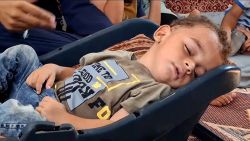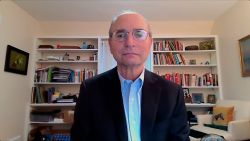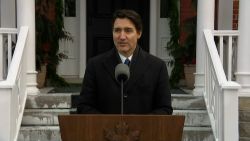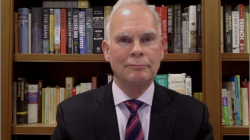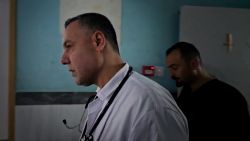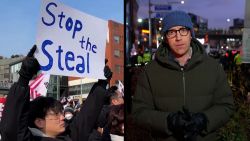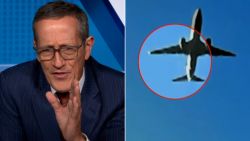Israel has agreed to a series of pauses in fighting in Gaza in September to allow young children in the enclave to be vaccinated for polio, according to United Nations and Israeli officials.
The polio campaign, which will aim to vaccinate around 640,000 children across Gaza, comes after the highly infectious virus was found in sewage samples in the Strip in June.
Rik Peeperkorn, the World Health Organization’s (WHO) representative for the West Bank and Gaza, told a press briefing from a video link Thursday that the pause would start September 1 and will be split into three 3-day phases.
“We have a preliminary commitment for area-specific humanitarian pauses during the campaign,” he said, adding that the pauses will roll out first in “central Gaza for three days, followed by south Gaza and then followed by north Gaza.”
The vaccination drive comes as aid agencies reported Israeli attacks on their convoys. One charity said an Israeli strike on a humanitarian vehicle in Gaza killed several employees of a transportation company. The Israeli military said it targeted “armed men” who had taken over the convoy.
The return of polio to Gaza is a measure of the destruction wrought by more than 10 months of Israeli bombardment. Polio vaccine coverage in the enclave was estimated at 99% in 2022, but had dropped to below 90% at the start of this year, according to WHO data. Peeperkorn warned that more than 90% coverage was needed to stop the outbreak.
The virus mostly affects children under five years old, and can cause irreversible paralysis and even death. It’s highly infectious and there is no cure; it can only be prevented by immunization, WHO says.
More than 2,000 health workers have been recruited in Gaza to take part in the ambitious vaccination campaign. So far, 1.26 million doses of vaccines have been delivered to the Strip, with 400,000 more on their way.
An Israeli official confirmed to CNN that polio vaccinations will begin in Gaza on Sunday. Each phase of the vaccination campaign is expected to take around seven hours, and during those hours, the vaccines will be able enter the area on “pause” and be distributed.
Vaccinations will begin in the central Deir Al-Balah region from September 1 to 4, then in the southern Khan Younis region from September 5 to 8, and in Gaza City and northern Gaza from September 9 to 12, the Palestinian Ministry of Health in Ramallah said. The ministry also published maps showing the locations of each vaccination center.
A source familiar with the vaccination rollout told CNN that the major challenge will be whether IDF soldiers on the ground honor the pauses in fighting. There are concerns that they will not, the source said, adding that the IDF’s standard operating procedure is to go after a Hamas target no matter what.
Hamas knows about the pauses and is expected to take advantage of them to move critical personnel and assets. The work now is to make sure the Israeli soldiers know that they cannot engage militarily during the pause, the source said.
Very little is known about the epidemiological profile of this strain of polio – the working assumption is that 500 people in Gaza are carrying it, the source added.
WHO Director General Tedros Adhanom Ghebreyesus said two doses of vaccine will be given in two rounds, four weeks apart – suggesting that further pauses may be arranged later.
Peeperkorn warned, however, that due to the damage to roads, infrastructure and the constant displacement of people caused by Israel’s assault, “conducting the campaign for just three days in each area is unlikely to be sufficient to achieve adequate vaccination coverage.”

Basem Naim, a member of Hamas’ political bureau, said the militant group welcomed the push for a pause in Gaza to implement the vaccination drive. “We are ready to cooperate with international organizations to secure this campaign,” he added.
Earlier this month, Abdul Rahman, an 11-month-old boy, was diagnosed with the disease – Gaza’s first recorded case of polio in 25 years. His mother, Niveen Abu al-Jidyan, told CNN how her child went from feverish and vomiting to partially paralyzed.
“My child started to move and crawl at an early age. But suddenly everything went backwards. Suddenly, he was no longer crawling or moving or able to stand on his feet or even sit,” she said. “He will be one next month. He should be walking by now, but he suddenly stopped moving.”
Israel’s offensive not yet relenting
Ahead of the expected pauses, Israel’s offensive in Gaza has continued. The Israel Defense Forces (IDF) said it had carried out an airstrike on a humanitarian aid convoy in Rafah, which it claimed had been taken over by armed men. Anera, the US-based charity that organized the convoy said several employees of the transport company it was working with were killed in the strike.
Sandra Rasheed, Anera’s country director for Palestine, told CNN the convoy was carrying medical supplies and fuel to the Emirati Red Crescent hospital in Gaza and condemned the “shocking incident.”
The IDF said it launched the strike after it had confirmed “that only the vehicle of the armed men could be attacked,” adding that the Anera employees had reached their destination “safe and sound.”
In a later statement, Anera said four Palestinians had been killed in the airstrike. No Anera staff were injured but one of its employees, in the second vehicle of the convoy, witnessed the incident at close range.
Anera said that shortly after the convoy left the Kerem Shalom crossing, “four community members with experience in previous missions and engagement in community security” with the transport company had asked to take command of the first vehicle, “citing concern that the route was unsafe and at risk of being looted.”
The NGO said the Israeli airstrike had been carried out “without any prior warning or communication.”
In a separate incident, the World Food Programme (WFP), which delivers aid throughout the Strip, said on Wednesday it is halting the movement of its employees after one of its vehicles, which it said was “clearly marked,” was targeted with repeated gunfire just meters from an Israeli checkpoint.
On Friday, US Deputy Ambassador to the United Nations said an Israeli investigation into the attack had found it was caused by a “communications error.” CNN has asked the Israeli military for more information.
Kate Phillips-Barrasso, the vice president of global policy and advocacy at Mercy Corps, a humanitarian group, told CNN Thursday that the success of the Gaza polio vaccination campaign “rests on real and reliable guarantees of safety — ones that have not been provided by the parties to this conflict over the last ten months.”
“Put simply, Gaza has become the most dangerous place in the world to be a child or a humanitarian worker,” she said.
Three-day periods ‘might not be enough’
WHO representative Peeperkorn said that as the three-day periods might not be enough to reach all those targeted, it “has been agreed, when needed, the campaign will be extended by one day per zone, or even more when necessary.”
The Hostages Families Forum, which campaigns for the release of hostages held by Hamas in Gaza, has also asked the WHO and the UN children’s agency, UNICEF, to include the hostages in the ongoing polio vaccination campaign and all other health interventions.
A United States official told CNN that Secretary of State Antony Blinken pushed Israeli Prime Minister Benjamin Netanyahu in their meeting last week on the polio vaccinations, telling Netanyahu it had to be a top priority and it had to get done.
Netanyahu agreed to work with the US on the details, the official said. US Special Envoy Lise Grande for Middle East Humanitarian Issues has been leading that effort, working to finalize the details between the Israeli government and the UN, including what the pauses would like and how the vaccines would be delivered.
WHO is joined in the vaccination effort by the Palestinian Ministry of Health, the United Nations Children’s Fund, the UN Relief and Works Agency for Palestine Refugees and other partners. Each organization has been assigned a role in the technical and strategic “microplan” to execute the vaccine campaign.
For weeks, the organizations have emphasized that some kind of ceasefire — what they are calling a “polio pause”— would be crucial to the effort’s success, and even to contain the disease from spreading to the broader region.
CNN’s Jennifer Hansler, Irene Nasser, Christian Edwards, Radina Gigova, Dana Karni, Irene Nasser, Tim Lister and Sharon Braithwaite contributed reporting.


